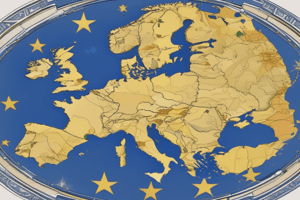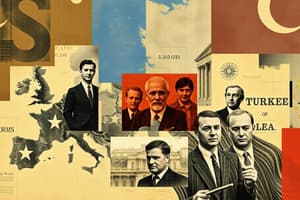Podcast
Questions and Answers
What is the primary purpose of ‘pre-accession’ financial aid from the EU?
What is the primary purpose of ‘pre-accession’ financial aid from the EU?
- To establish military alliances with candidate countries
- To monitor human rights practices in candidate countries
- To enforce trade tariffs on candidate countries
- To assist candidate countries in economic development (correct)
Which agreement is typically associated with candidate countries during negotiations with the EU?
Which agreement is typically associated with candidate countries during negotiations with the EU?
- Stabilisation and Association Agreement (correct)
- Comprehensive Partnership Agreement
- Common Market Agreement
- Economic Development Agreement
What stage follows after achieving the economic goals set by the ‘pre-accession’ financial aid?
What stage follows after achieving the economic goals set by the ‘pre-accession’ financial aid?
- Post-accession economic reform
- Immediate suspension from negotiations
- Formal evaluation of military capability
- Full EU membership application (correct)
Which of the following is NOT a characteristic of the ‘stabilisation and association agreements’?
Which of the following is NOT a characteristic of the ‘stabilisation and association agreements’?
Why are ‘pre-accession’ financial aids crucial for candidate countries?
Why are ‘pre-accession’ financial aids crucial for candidate countries?
What characterizes Europe's post-industrial societies?
What characterizes Europe's post-industrial societies?
Which statement reflects the current trend in European societies?
Which statement reflects the current trend in European societies?
In a globalized world, what is a notable change in Europe?
In a globalized world, what is a notable change in Europe?
How does globalization affect European identity?
How does globalization affect European identity?
What is a significant characteristic of modern European societies in the context of globalization?
What is a significant characteristic of modern European societies in the context of globalization?
What was the primary goal of the EU countries regarding nuclear energy?
What was the primary goal of the EU countries regarding nuclear energy?
What role does the Joint Research Centre play in relation to nuclear energy?
What role does the Joint Research Centre play in relation to nuclear energy?
How many research institutes make up the Joint Research Centre?
How many research institutes make up the Joint Research Centre?
What type of approach does the EU take towards nuclear energy based on the content?
What type of approach does the EU take towards nuclear energy based on the content?
The initiatives mentioned aim to support which specific aspect of nuclear energy?
The initiatives mentioned aim to support which specific aspect of nuclear energy?
What has been abolished within the EU concerning the border controls on goods?
What has been abolished within the EU concerning the border controls on goods?
Despite the abolition of certain controls, what type of police activity remains in the EU?
Despite the abolition of certain controls, what type of police activity remains in the EU?
What primary purpose do the random spot checks conducted by police serve?
What primary purpose do the random spot checks conducted by police serve?
Which of the following statements is true regarding customs controls within the EU?
Which of the following statements is true regarding customs controls within the EU?
What has not changed regarding border controls in the EU?
What has not changed regarding border controls in the EU?
What is a primary focus of the EU's activities in land transport?
What is a primary focus of the EU's activities in land transport?
Which of the following challenges may impact the EU's focus on land transport services?
Which of the following challenges may impact the EU's focus on land transport services?
What is an expected outcome of ensuring freedom to provide services in land transport by the EU?
What is an expected outcome of ensuring freedom to provide services in land transport by the EU?
Which aspect is NOT directly related to the EU's activities in land transport?
Which aspect is NOT directly related to the EU's activities in land transport?
How does the EU's focus on land transport benefit its member states?
How does the EU's focus on land transport benefit its member states?
What is a primary goal mentioned in the context of financing for small businesses?
What is a primary goal mentioned in the context of financing for small businesses?
What is being discussed alongside small business financing?
What is being discussed alongside small business financing?
How might the reforms of corporate taxation impact investment in Europe?
How might the reforms of corporate taxation impact investment in Europe?
Which of the following could be a likely outcome of making financing easier for small businesses?
Which of the following could be a likely outcome of making financing easier for small businesses?
What is implied about the current financing climate for small businesses in Europe?
What is implied about the current financing climate for small businesses in Europe?
Flashcards
Post-industrial societies
Post-industrial societies
The process of transitioning from a manufacturing-based economy to one that relies more on services and information technology.
Globalization
Globalization
The increasing interconnectedness and interdependence of countries and societies around the world.
Identity
Identity
The unique characteristics and experiences that define a group of people, such as shared history, culture, and values.
Diversity
Diversity
Signup and view all the flashcards
European Identity in a Globalized World
European Identity in a Globalized World
Signup and view all the flashcards
Pre-Accession Financial Aid
Pre-Accession Financial Aid
Signup and view all the flashcards
Stabilization and Association Agreements
Stabilization and Association Agreements
Signup and view all the flashcards
EU Accession Process
EU Accession Process
Signup and view all the flashcards
Negotiation Period
Negotiation Period
Signup and view all the flashcards
Candidate Country
Candidate Country
Signup and view all the flashcards
Joint Research Centre
Joint Research Centre
Signup and view all the flashcards
Peaceful Purposes
Peaceful Purposes
Signup and view all the flashcards
Exploit Nuclear Energy Together
Exploit Nuclear Energy Together
Signup and view all the flashcards
Seven Research Institutes
Seven Research Institutes
Signup and view all the flashcards
What Does the EU Do?
What Does the EU Do?
Signup and view all the flashcards
Free Movement of Goods within the EU
Free Movement of Goods within the EU
Signup and view all the flashcards
Free Movement of People within the EU
Free Movement of People within the EU
Signup and view all the flashcards
EU Border Controls
EU Border Controls
Signup and view all the flashcards
Spot checks as part of crime-fighting
Spot checks as part of crime-fighting
Signup and view all the flashcards
EU's fight against drugs
EU's fight against drugs
Signup and view all the flashcards
Easing Financing for Small Businesses
Easing Financing for Small Businesses
Signup and view all the flashcards
Attracting Investments to Europe
Attracting Investments to Europe
Signup and view all the flashcards
Corporate Taxation Reforms
Corporate Taxation Reforms
Signup and view all the flashcards
Simplifying Small Business Financing
Simplifying Small Business Financing
Signup and view all the flashcards
Discussions on Corporate Tax Changes
Discussions on Corporate Tax Changes
Signup and view all the flashcards
Freedom to provide services in land transport
Freedom to provide services in land transport
Signup and view all the flashcards
EU Activities in Land Transport
EU Activities in Land Transport
Signup and view all the flashcards
Land Transport
Land Transport
Signup and view all the flashcards
Transportation Services
Transportation Services
Signup and view all the flashcards
Ensuring Freedom to Provide Services
Ensuring Freedom to Provide Services
Signup and view all the flashcards
Study Notes
Europe in 12 Lessons
- The European Union (EU) aims to maintain and build upon peace, bringing countries together for practical cooperation, ensuring citizen security, promoting economic and social solidarity, preserving European diversity and promoting shared European values.
- The EU has 12 lessons focusing on: Protection, Together, Growth, Development, European Union, Digital, Single market, Jobs, Values, Economy, Peace, Solidarity, and Citizens.
- The EU's 12 lessons cover the historical steps to European integration, how the EU works, economic and social solidarity, European identity and diversity in a globalised world, and the future of Europe.
- The EU's aim is to: Maintain and build upon the existing peace between member states and their neighboring countries; Bring European countries together in practical cooperation; Ensure that European citizens can live in security; Promote economic and social solidarity; Preserve European identity and diversity in a globalized world; and Promote the values shared among Europeans.
- The European Union was created as a response to the devastation of World War II to establish lasting peace, creating common structures based on treaties for equality among members.
- The European Coal and Steel Community (ECSC) was proposed by Robert Schuman as a practical and symbolic way to pool raw materials of war, reconciling Europe.
- The EU has encouraged German unification after the fall of the Berlin Wall in 1989, and several Eastern European countries joined the EU in 2004, 2007, and 2013.
- The EU faced a major crisis in 2008 and continues to face security, immigration, and economic concerns.
- The EU has maintained stability among member states by creating organizations like Eurojust, Europol.
- The EU promotes humanitarian values and progressive actions, and is not reliant solely on market forces to meet citizen needs, but rather promotes rights, social solidarity, and diversity .
- The EU has a legally binding Charter of Fundamental Rights.
- The EU comprises 28 member states.
- The EU continues to evolve with ongoing negotiations to expand membership.
- The EU has different decision-making institutions.
- The European Parliament, representing the citizens, shares legislative and budgetary power with the Council.
- The European Council, made up of national ministers, makes policy decisions & EU laws, as the executive body.
- The European Commission, representing the EU as a whole, proposes legislation and ensures EU policies are implemented.
- EU's actions focus on economic growth, security, and justice through cooperation and common policies.
- The EU has a system of 'own resources'.
- Revenue is mainly drawn from customs duties on imports, VAT and member state contributions.
- Key EU priorities include new jobs, growth, investment, digital market, resilient energy, fair internal market.
Key dates in the history of European Integration
- 1950 - Schuman Declaration proposes the pooling of coal and steel resources.
- 1951 - The Treaty of Paris established the European Coal and Steel Community (ECSC).
- 1957 - Treaties of Rome established the European Economic Community (EEC) and the European Atomic Energy Community (Euratom).
- 1973 - The European Communities expanded to include Denmark, Ireland, and the United Kingdom.
- 1979 - First direct elections to the European Parliament.
- 1981 - Greece joins the European Economic Community (EEC).
- 1986 - Spain and Portugal joined the European Communities.
- 1992 - Treaty on European Union is signed in Maastricht.
- 1993 - The European single market established.
- 1999 - The Euro was introduced.
- 2002 - Euro notes and coins introduced.
- 2004 - Ten new countries joined the EU.
- 2007 - Bulgaria and Romania joined the EU.
- 2009 - Treaty of Lisbon comes into effect.
- 2012 - The European Union awarded the Nobel Peace Prize.
- 2013 - Croatia joined the EU, EU membership reached 28.
- 2014 - European elections and new European Commission President appointed.
- 2015 - EU countries negotiated a climate agreement in Paris.
- 2016 - Referendum in the United Kingdom resulting in the UK leaving the EU.
Studying That Suits You
Use AI to generate personalized quizzes and flashcards to suit your learning preferences.




